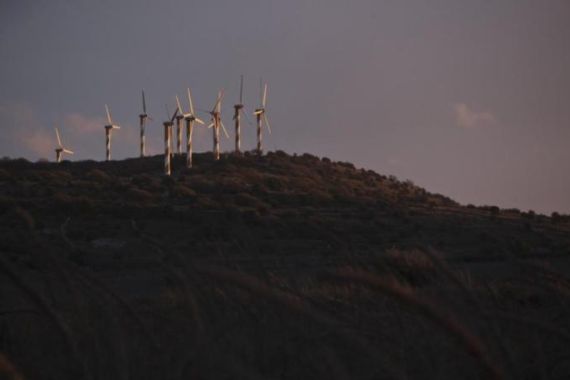Israel, Obama, and other people’s oil
If the US stops Genie Energy from going ahead with oil contract, it invites the wrath of myriad pro-Israel groups.

The schedule for President Barack Obama’s first visit to Israel and the Palestinian territories next week has just been released and it is no surprise that the occupied Syrian Golan Heights is not on his travel agenda.
And yet Israel put it on the international agenda less than a month ago with its award of a licence to a US energy firm to explore for oil in the Golan Heights. Oil drilling by the New Jersey-based Genie Energy Ltd in the occupied Golan Heights could well result in a lawsuit claiming that Israel is engaged in an illegal act of pillage as defined in the Hague Convention. Perhaps Israel is now so used to living off the fat of other people’s land – Palestinian and Syrian soil and water, among other resources – it has seemingly thrown caution to the wind.
The award puts the US on the spot. If the Obama administration tries to stop Genie from going ahead with the contract, it invites the wrath of myriad pro-Israel groups and their neocon allies, whose strength was most recently on display in the battle to confirm Chuck Hagel as Secretary of Defense.
And if the administration ignores the oil deal, it leaves US corporations exposed to potential lawsuits for profiteering from Israel’s violations of human rights and international law.
An additional worry for the Obama administration is the cast of characters involved in Genie Energy. The company is headed by former Israeli minister of infrastructure Effie Eitam, who lives in one of the illegal settlements on the Golan Heights, and includes former vice president Dick Cheney as an adviser and Rupert Murdoch as a shareholder.
Of course, Israel thinks it can get away with it. It has violated international law with impunity since it prevented the Palestinian refugees’ return, annexed East Jerusalem, and extended Israeli law to the Golan Heights, among other transgressions. Moreover, although Israel’s settlement building in the territories is regularly condemned, international sanctions have yet to be imposed.
In fact, the US, the European Union and other donor nations effectively subsidise Israel’s exploitation of Palestinian resources. Their aid to the Palestinian Authority enables Israel to get on with its colonisation at little or no cost to its budget, and to make a handsome profit from the Golan-based wine industry, beauty products from the Dead Sea, and other natural resources. This ignores the limitations on such exploitation of occupied territory clearly set out in the Annex to the Fourth Geneva Convention and widely recognised as applying to the territories occupied in 1967.
A further irony is that Israel makes donor aid necessary by blocking sovereign Palestinian development of their own resources, especially water, but also others such as the potentially lucrative gas field off the Gaza Strip.
Furthermore, even as it plans to illegally drill for oil in the occupied Golan Heights, Israel appears to have its eye on the occupied West Bank’s oil, as revealed by classified Foreign Office correspondence obtained through the United Kingdom’s Freedom of Information Act. As one staffer in Jerusalem wrote, it was “hard enough” to justify to British taxpayers “spending 100 million pounds a year on an economy that would be self-sufficient if able to exploit its own natural resources. Harder still if those resources included oil”.
However, the tide is turning though perhaps too slowly for Israel to notice. EU member states are increasingly nervous about their implication in international law violations. For example, some EU states have been labelling settlement goods as coming from occupied territory. Most recently, EU consuls general in East Jerusalem and Ramallah issued an unprecedented report recommending sanctions on bodies involved in construction in Israeli settlements and much stricter application of the EU-Israel free trade agreement.
These recommendations have yet to be translated into policy, but the EU consuls’ report has pushed the “S” in BDS – the Palestinian-led campaign of boycott, divestment and sanctions against Israel’s violations of international law – further into the mainstream.
Israel’s drilling award is certainly a gift to the global BDS movement, which has scored many successes against companies doing business in the Palestinian territories. So far, campaigns on the Golan Heights have largely focused on Eden Springs water and Golan wines with good results. A US company breaking international law in the Golan Heights would be an obvious target.
The oil contract will also spotlight the racism of a growing number of Israelis toward Palestinians. Genie Energy’s Eitam provides particularly rich fodder. In a 2006 interview, he called for most Palestinians to be expelled from the occupied territories and for Palestinian citizens of Israel to be removed “from the political system”.
Israel may be betting that the international community’s preoccupation with Syria will not extend to the Syrian Golan Heights and that it will get away with it again. But it would do well to remember that even slow grinding wheels can produce justice.
Nadia Hijab is Director of Al-Shabaka: The Palestinian Policy Network.
